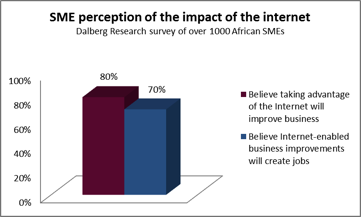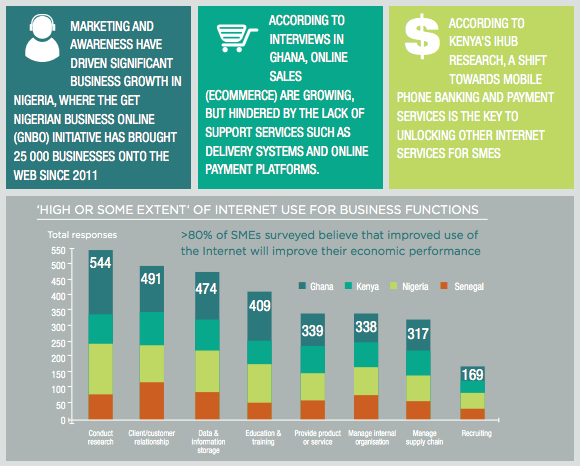NexThought Monday – Want to Help Africa’s SMEs? Improve Their Internet Access: A new report from Dalberg highlights the Web’s huge social and economic potential
Food Export International is a food export business operating out of Accra, Ghana. Eric Kwaku started the company by himself in 2005. Since then, it has grown to include 10 management staff, selling produce from more than 100 food suppliers and farmers to overseas markets. Food Export International’s success can be attributed to a good idea, talented staff and, according to Kwaku, the Internet. The reach and capabilities of Ghana’s Internet have advanced enormously since 2005, enabling Food Export International to market itself to customers with whom it previously would not have had contact and to showcase its offerings beside those of larger, more established organizations.
Like Food Export International, small and medium enterprises (SMEs) across Africa are recognizing the important role that the Internet can play in their development. In a recent Dalberg survey of exceeding 1,000 SMEs in Ghana, Kenya, Senegal and Nigeria, more than 80 percent of those surveyed believed that taking better advantage of the Internet would improve their business’s performance. What’s more, 70 percent of these same SMEs expected that increased business performance would mean new job opportunities in their organization.
 SMEs play a very important role in developing economies because they typically comprise a major share of employment and GDP. Recognizing this, African policymakers have increasingly focused on SME growth in their economic and job development targets. Last year the African Development Bank (along with the governments of Denmark and Spain) launched the African Guarantee Fund to promote access to finance for SMEs. The World Bank and IFC have established a number of programs to support SMEs in Africa. South Africa’s National Development Plan has specifically highlighted the need to lower the cost of doing business for small enterprises.
SMEs play a very important role in developing economies because they typically comprise a major share of employment and GDP. Recognizing this, African policymakers have increasingly focused on SME growth in their economic and job development targets. Last year the African Development Bank (along with the governments of Denmark and Spain) launched the African Guarantee Fund to promote access to finance for SMEs. The World Bank and IFC have established a number of programs to support SMEs in Africa. South Africa’s National Development Plan has specifically highlighted the need to lower the cost of doing business for small enterprises.
However, little of the growing SME dialogue has focused on opportunities provided by the Internet. The Dalberg survey shows that the Internet is assisting SMEs with top-line growth through marketing and sales, as well as bottom-line operational improvements through increased efficiency in information management. And benefits from the Internet accrue to consumers as well as sellers. As more companies get online, prices and service offerings become increasingly transparent – meaning that consumers can choose the most efficient service delivery at the best price.
SMEs in Africa still have some way to go. Despite demonstration of the cost savings linked to digitization, over half of SMEs surveyed by Dalberg had less than 50 percent of their record keeping and client management documents digitized. Nearly 10 percent made no use of digitization whatsoever. Major constraints to using the Internet include access to reliable network connections, the price of connecting and, in some cases, the lack of attractive Internet applications. Solve these problems, and the potential impact on society at large is enormous.

Steps are under way to do exactly that. In February, Ghana’s Ministry of Trade and Industry launched an online SME portal to enhance the business of micro, small and medium enterprises in Ghana. And in May, the Ministry launched an “Innovation Ghana” initiative with Google, in part to recognize Ghanaians who use the Internet to deliver smart technological solutions to existing issues.
The SME survey was conducted for a report, The Impact of the Internet in Africa: Establishing conditions for success and catalyzing inclusive growth in Ghana, Kenya, Senegal and Nigeria, which documents how the Internet is affecting a number of sectors, from education to governance. For more on the Internet in Africa, including usage trends, case studies, country profiles and sector-by-sector analyses, we encourage you to read the full report.
Daniel Kaplan is a Senior Researcher at Dalberg Research, and a member of the team from Dalberg Global Development Advisors that produced the Impact of the Internet report with support from Google.
- Categories
- Education, Technology, Telecommunications
